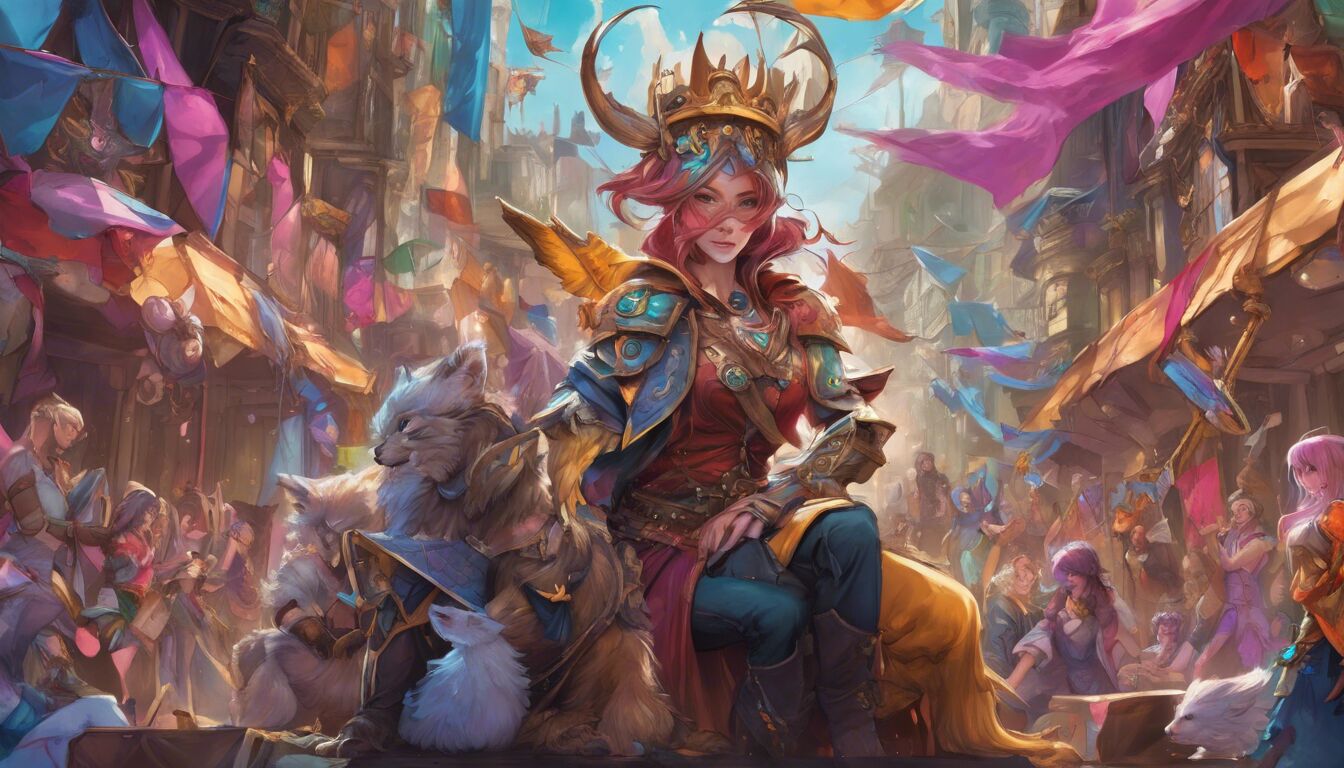blog
Mastering Marketing for Fantasy Authors
In any successful fantasy book marketing strategy, understanding your target audience is paramount. This foundational step helps you tailor your marketing efforts to resonate deeply with potential readers. Start by identifying the demographics of your ideal readers. Are they young adults drawn to epic battles and complex characters, or do they prefer more mature themes interwoven with intricate world-building? Surveys and social media polls can be extremely useful in gathering this data.
Dive deeper into the psychographics of your audience. What are their interests, hobbies, and daily challenges? Fans of fantasy often enjoy other speculative fiction genres, role-playing games, and are attracted to mythological themes. Knowing this can guide your marketing towards the right channels and messages. For example, if a significant portion of your target audience enjoys tabletop RPGs, collaborations with game stores or online gaming forums can be incredibly effective.
Utilize sales data and analytics from your previous books to gain insights. Which titles sold the best, and what common elements did they share? Analyzing reader reviews can also provide clues about what your audience loves or dislikes. As J.K. Rowling aptly put it: “The stories we love best do live in us forever.” Understanding why your audience connects with certain stories over others can be invaluable in designing your next marketing campaign, get redirected here.
Be aware of the competitive landscape. Study the marketing strategies of successful fantasy authors who share a similar target market. What are they doing right, and how can you differentiate your approach while still appealing to your shared audience? Sometimes, offering something uniquely compelling is the key to standing out.
Engage directly with your audience. Host Q&A sessions, participate in relevant online forums, and attend fantasy conventions. These interactions provide real-time feedback and build a loyal community around your books. When readers feel heard and valued, they are more likely to become advocates for your work, spreading the word organically.
Building your author brand

When building your author brand, consistency and authenticity are crucial. Your brand is essentially how readers perceive you and your books. Start by defining your unique selling proposition (USP) – what sets you apart from other fantasy authors? Is it your intricate world-building, your unforgettable characters, or perhaps your knack for blending mythology with modern themes? Whatever it is, make sure it shines through in all aspects of your marketing.
Creating a compelling author bio is an excellent first step. This bio should not only list your achievements but also tell a story that resonates with your target audience. Highlight what inspired you to write fantasy books and share personal anecdotes that make you relatable. A well-crafted bio can set the tone for all your interactions, whether on your website, social media, or book jacket.
Your author photo is another key element of your brand. Choose an image that reflects the tone of your books. For instance, if your fantasy novels are dark and moody, an edgy, dramatic photo might be appropriate. Conversely, a more whimsical story could be complemented by a lighter, more playful photo.
Develop a consistent visual style that mirrors the themes and tone of your books. This includes everything from your website design to your social media graphics. A cohesive visual identity helps readers instantly recognize your work. Elements like color schemes, fonts, and even the style of imagery used can make a significant impact on how your brand is perceived.
Equally important is your voice. Your writing style, coupled with the tone you use in communications and promotions, should be consistent. Whether you’re posting on social media, writing a newsletter, or engaging with fans in a forum, your voice should feel distinct and recognizable.
“Your brand is a story unfolding across all customer touch points.” – Jonah Sachs
In the realm of fantasy book marketing, collaborations can amplify your brand. Consider teaming up with other authors, illustrators, or even influencers in the fantasy community. Joint book signings, cross-promotions, and co-authored projects can introduce you to new readers and enrich your brand.
Additionally, content marketing is a powerful tool for building your brand. Blog posts, podcasts, or even video content about your creative process, world-building tips, or character development can attract fans and establish you as an authority in your genre. Offering exclusive content through a blog or a YouTube channel can significantly boost your visibility and engagement.
Never underestimate the power of reader feedback. Encourage your fans to leave reviews, share their thoughts on social media, and participate in discussions. Their testimonials and insights can not only help you improve but also add credibility to your brand. Recognizing and celebrating your readers’ contributions can foster a loyal and passionate community around your work.
Creating compelling book covers

Creating a compelling book cover is one of the most critical aspects of fantasy book marketing. Your cover is often the first interaction a potential reader has with your book, and it needs to capture their imagination instantly. Investing in professional cover design can significantly impact your book’s success. A top-notch cover not only attracts attention but also conveys the genre, tone, and essence of your story.
Start by researching successful books within the fantasy genre. Notice the common elements they share, such as typography, color palettes, and imagery. Understanding these trends can help you design a cover that fits within the genre while still standing out. However, merely copying popular covers isn’t the goal; instead, aim to capture the spirit of your book in a unique way. Consider elements specific to your story – whether it’s a particular landscape, an iconic character, or a crucial symbol. These elements can make your cover not just attractive but also meaningful to readers.
Choosing the right artwork is another vital component. Custom illustrations can make your cover truly unique and tailored to your story. Work with an artist who understands fantasy and can translate your vision into a captivating visual. This collaboration should be detailed – provide descriptions, reference images, and specific ideas to ensure the final product aligns with your expectations. Character portrayal, setting, and mood are essential aspects that should be meticulously considered.
Typography is equally important. The font style and placement should complement the artwork and enhance the overall aesthetic without overshadowing it. Fantasy book covers often benefit from bold, fantastical fonts that reflect the epic nature of the genre. However, readability should never be sacrificed for style. Ensure that the title and author’s name are clear and legible, even in thumbnail size, which is how many readers will first encounter your book online.
Color schemes play a critical role in setting the tone. Dark, rich hues can evoke a sense of mystery and adventure, fitting for darker fantasy tales, while lighter, more vibrant colors can suggest a more whimsical or high-fantasy adventure. Consistency in color can also be a branding tool if you’re planning a series. A uniform color palette across all books in a series can create a cohesive, recognizable look that draws readers back.
Don’t underestimate the power of feedback before finalizing your cover. Solicit opinions from beta readers, fellow authors, and your target audience. Conducting a cover poll on social media or within a fan group can provide useful insights and ensure your cover resonates well with its intended audience. Such engagement not only helps refine your design but also builds anticipation for your book.
The back cover and spine shouldn’t be overlooked. These areas serve not only as extensions of the front cover’s artwork but also house essential information like the book blurb, author bio, and endorsements. These elements should be well-designed and inviting, providing readers with just enough intrigue to pique their interest further. Consider using specific descriptors and keywords that align with popular search terms in fantasy book marketing to maximize visibility and appeal.
Lastly, remember that your book cover is part of a broader visual strategy that includes marketing materials, social media posts, and website graphics. A cohesive visual identity across all platforms will enhance your branding efforts and ensure your book is memorable. High-quality, eye-catching cover design is an investment that can pay off in increased visibility, sales, and reader engagement.
Utilizing social media effectively
Engaging readers on social media is an indispensable part of fantasy book marketing. To do this effectively, diversify your presence across several platforms, each catering to different aspects of your reader engagement strategy. Allocate time to understanding the nuances of each platform to leverage them to your advantage.
Start by creating a dedicated author page on Facebook. This platform is ideal for building a community around your books. Engage in fantasy-oriented groups and participate in discussions about related topics. Regularly update your page with news about your books, behind-the-scenes content, and personal insights. Facebook’s event feature is perfect for announcing book launches, Q&A sessions, and other virtual events. Utilize its advertising tools to create targeted campaigns that reach fantasy readers based on their interests, behaviors, and demographics.
Twitter, with its real-time nature, is excellent for continuous engagement. Participate in popular fantasy hashtags like #FantasyBooks, #AmWritingFantasy, and #IndieAuthors to join the broader conversation and increase your visibility. Share quick updates, quotes from your books, and interact directly with fans and followers. Follow influential figures within the fantasy community, retweet relevant content, and don’t hesitate to jump into ongoing discussions to share your viewpoints. Twitter’s fast-paced environment allows for spontaneous and authentic communication, which can help to humanize your author persona.
Instagram, with its visual-centric approach, is perfect for showcasing stunning book covers, fan art, and writing aesthetics. Create a cohesive feed that reflects the themes and tones of your books. Use Instagram Stories and Reels to provide glimpses into your writing process, book signings, and daily author life. Engaging visual content, such as character sketches or world maps, can captivate your followers and keep them intrigued. Additionally, collaborating with bookstagrammers—users dedicated to sharing book-related content—can dramatically increase your reach within the reading community.
For professional networking and thought leadership, LinkedIn should not be overlooked. Use it to connect with other authors, literary agents, and industry professionals. Share articles about the craft of writing fantasy, your publishing journey, and your success stories. This platform is also suitable for finding and engaging with fellow authors and contributing to professional groups focused on writing and book marketing.
Pinterest, an underrated tool for authors, can drive significant traffic to your website or online store. Create boards that align with your books’ themes, such as “Fantasy Worlds,” “Epic Battles,” or “Mythical Creatures.” Pin images that inspire your writing along with links to your blog posts, book reviews, and purchase pages. Since Pinterest functions more like a search engine, optimizing your pins with relevant keywords can help you attract readers interested in fantasy literature.
YouTube is another powerful platform for deeper engagement. Consider launching an author channel where you can post book trailers, author interviews, writing tips, and live reading sessions. These videos can be both entertaining and informative, attracting new readers and keeping current fans engaged. Live streaming on YouTube or other platforms like Facebook Live and Instagram Live can create real-time interactions with your audience, fostering a closer connection.
Finally, TikTok has rapidly become influential within the book community, especially with the rise of BookTok. Short, engaging videos can go viral quickly, reaching a vast audience. Share snippets of your writing journey, fun facts about your book’s universe, and dramatic readings of key scenes. Using popular trends and sounds while adding your unique twist can make your content stand out.
Utilizing multiple social media platforms strategically can significantly enhance your fantasy book marketing efforts. Track your engagement metrics to understand what content resonates most with your audience and adjust your strategy accordingly. Engaging with followers’ comments, messages, and shares is crucial in building relationships and nurturing a loyal reader base. Consistency, creativity, and genuine interaction are the pillars of effective social media marketing for fantasy authors.
Leveraging email marketing
 When it comes to growing your readership and maintaining a loyal fan base, email marketing is an exceptionally powerful tool in the arsenal of fantasy book marketing. Its direct-to-reader nature enables you to build meaningful, long-term relationships with your audience.
When it comes to growing your readership and maintaining a loyal fan base, email marketing is an exceptionally powerful tool in the arsenal of fantasy book marketing. Its direct-to-reader nature enables you to build meaningful, long-term relationships with your audience.
Start by building a robust email list. Offer incentives for readers to subscribe, such as exclusive short stories, deleted scenes, or behind-the-scenes insights into your writing process. Ensure that the sign-up process is seamless and prominently featured on your website, social media platforms, and at the end of your books. Engaging lead magnets are the key to growing your list swiftly and effectively.
Once you’ve built your list, the next step is maintaining regular, valuable communication with your subscribers. Consistency is crucial—whether it’s a monthly newsletter or bi-weekly updates, establish a schedule your readers can anticipate. Not every email needs to be a sales pitch. Instead, aim to provide value, such as writing tips, snippets of forthcoming works, or personal reflections on your journey as a fantasy author.
To ensure your emails resonate, segment your list based on reader preferences and behaviors. For instance, new subscribers might appreciate an introductory sequence that familiarizes them with your work, while long-time fans might prefer updates on new releases or upcoming events. Tailoring your content to different segments can significantly enhance engagement rates and foster a more personalized reader experience.
Craft compelling subject lines that spark curiosity and interest. The goal is to entice your readers to open the email amidst the clutter of their inbox. Personalization can also go a long way—using the recipient’s name or referencing their past interactions with your content can create a more intimate and engaging experience.
Inside your emails, keep the content engaging and visually appealing. Use a mix of text and images to break up the information and maintain reader interest. A well-designed email with eye-catching visuals can make a lasting impression. Book teasers, cover reveals, and character illustrations can all serve as enticing visual elements.
Interactive elements, such as polls or surveys, can also increase engagement. Inviting readers to vote on elements like character names or plot twists can make them feel invested in your storytelling process. This level of interaction not only keeps your audience engaged but also provides valuable feedback that can inform your writing and marketing strategies.
Don’t forget to include clear calls-to-action (CTAs). Whether it’s directing readers to a new blog post, encouraging them to pre-order your latest book, or signing up for a virtual event, explicit CTAs guide your readers to take the desired actions and drive measurable results.
Monitoring your email marketing metrics is vital for ongoing success. Pay attention to open rates, click-through rates, and conversion rates to understand what types of content and subject lines resonate the most with your audience. Tools like A/B testing can help you refine your approach by comparing the performance of different email versions.
Lastly, ensure that your emails comply with legal regulations, such as the CAN-SPAM Act. Providing an easy way for readers to unsubscribe and ensuring transparent privacy practices are not just legal obligations but also best practices for maintaining trust with your audience.
In the competitive landscape of fantasy book marketing, leveraging the power of email allows you to cultivate a dedicated reader base, promote your work consistently, and ultimately drive book sales. Engaging directly with your readers through this medium can create a loyal community excited to support your creative endeavors.
By thoughtfully integrating email marketing into your broader strategy, you’re not just sending out updates—you’re building a fantasy world that readers eagerly return to, email after email.
Engaging with the fantasy community

Deepening your involvement with the fantasy community is a vital strategy for fantasy book marketing. Engaging with your core audience within this realm can foster strong connections, enhance your visibility, and build a network of dedicated readers and influencers who are passionate about your work. Start by identifying where your target audience spends their time online and offline, and make a concerted effort to establish a presence in those spaces.
Join fantasy-specific forums and online communities. Websites like Reddit have active subreddits such as r/Fantasy, where writers and readers discuss various aspects of the genre. Participate in these conversations genuinely—offer advice, share your experiences, and actively engage with threads pertinent to your writing. Avoid self-promotion until you’ve established a rapport; focus instead on being a valuable member of the community.
Attend and participate in conventions, both physical and virtual. Events such as Comic-Con, Dragon Con, or FantasyCon provide excellent opportunities to network with other authors, meet fans, and gain exposure. Host panels, give readings, or set up a booth to sell and sign copies of your book. Conventions are also a great place to make connections with industry professionals, such as agents, publishers, and illustrators, who can offer invaluable support and collaboration opportunities.
Collaborate with other fantasy authors and creators. Cross-promoting with others can expand your reach and introduce your work to new audiences. Consider co-hosting webinars or online events, guest blogging on each other’s websites, or co-writing a short story or anthology. Building a network of supportive peers can amplify your visibility and validate your standing within the fantasy community.
Engage with book bloggers and reviewers who specialize in fantasy literature. A well-written review from a reputable blogger can significantly impact your book’s visibility and credibility. Offer them free copies for honest reviews and be prepared to reciprocate with cross-promotions or author interviews. Positive reviews can then be shared on your social media platforms and included in your email marketing campaigns.
Another effective method to immerse yourself in the fantasy community is through Patreon or similar platforms. Creating a membership system where fans can subscribe for exclusive content, early access to chapters, and behind-the-scenes insights can build a more intimate and loyal following. Offering varied tiers of membership rewards can also provide a steady stream of income and valuable feedback from your most dedicated readers.
Live interaction through platforms like Discord can also foster deeper engagement. Setting up a Discord server dedicated to your books allows fans to discuss your work, share fan art, and participate in live chats. Hosting regular interaction sessions such as book club meetings, Q&As, and writing sprints can create a sense of community and loyalty among your readers.
Don’t underestimate the power of fan culture. Encourage and celebrate fan creations, whether they’re fan art, fan fiction, or cosplay. Sharing these on your own platforms shows appreciation and helps to cultivate a deeper, emotional connection with your audience. When fans feel recognized and valued, they are more likely to stay engaged and promote your work through word-of-mouth.
Leveraging online writing groups and workshops can also enhance your presence within the fantasy community. Participate in, or even host, online writing workshops and critique groups. These not only improve your craft but also establish you as an active, supportive member of the writing community. Networking with fellow writers through these channels can result in invaluable advice, beta reading, and promotional support.
Lastly, maintain an active and responsive presence across all these touchpoints. Consistent and meaningful engagement with the fantasy community helps build a solid reputation as an author who values their readers. By embracing the spirit of the community and offering genuine contributions, you build not just an audience, but a loyal following eager to support your work.”
Incorporating deeper community involvement into your fantasy book marketing strategy can significantly elevate your reach and impact. It’s not just about promoting your book; it’s about becoming an integral part of the world that inspires your stories and the people who love them.

